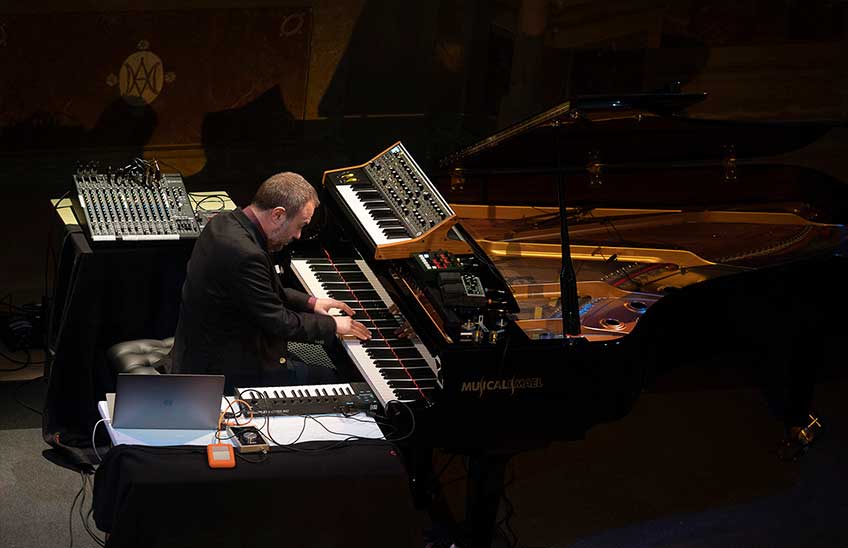Moisés P. Sánchez presents 'Tractatus' at the MUN, a journey through the languages of the piano, from classical to jazz, electronics and improvisation.
In the concert, to be held on March 31 (7:30 p.m.), music and philosophy go hand in hand, inspired by Ludwig Wittgenstein's book of the same name.

PhotoS. Torralba/Pianist Moisés P. Sánchez
24 | 03 | 2023
Moisés P. Sánchez presents on Friday, March 31 (7:30 p.m.) at the Museo Universidad de Navarra Tractatusa journey through the languages of the piano, which explores from classical music to jazz, electronics and free improvisation. The musician, of surprising imagination, awarded inside and outside our borders, is inspired by the homonymous book by Ludwig Wittgenstein, on the occasion of its centenary in 2021, to create this piece that presents a dialogue in which music and philosophy go hand in hand. Tickets are 14 and 16 euros. On March 30 (7 p.m.), Sef Hermans, musicologist, and Paloma Pérez Ilzarbe, professor of analytical philosophy, moderated by Nathaniel Barrett, philosopher and musician, will discuss this proposal in a new session of the series How to do things with... Free admission with prior withdrawal of invitation until full capacity is reached.
"Through different aphorisms from Wittgenstein's Tractatus and a process of documenting his life, I articulated seven movements inspired by the main thought that is structured in the book, which is about logic and thought. Music, even though it is a language, provokes thoughts and emotions for which logical thought is often not enough, but which contain all the meaning for us and which we feel and see with overwhelming clarity," explains the musician.
In this sense, he points out that he finds it "very interesting to contrast and look for this sensation in the compositions I propose and to have in front of me the main reasoning of the Tractatus, which essentially states that everything that we cannot articulate and expose through language and logical thought is meaningless. I do not fully agree with this idea, and I am also dedicated to an art that I believe reaches precisely those corners and gaps that defy this logic, so this idea was what I found really interesting to contrast, and to confront. Obviously, in a process like this, everything is very subjective and abstract in a certain sense, but the longing is to look for those gaps to raise my doubts about the main ideas and which, in fact, Wittgenstein recanted at the end of his life it seems".
The result is seven compositions based on different languages: "There is a lot of improvisation based on contemporary jazz language, compositions with an aesthetic very close to the music of the first half of the 20th century (Bartôk, Stravinsky), moments of free improvisation and very reflective moments, trying to approach a meditative state, especially in the final stretch of the concert," he says.
For the artist, this diversity of languages "are anchors that a musician has at his disposal to try to capture different types of emotion. Various states can be reached through the same resources, and it depends a lot on how the performer or creator approaches them. In this case, the person who improvises is also the one who composes, and many times I like to take the language I use in improvising to the limit, as a drift towards atonality or polytonality, for example, to juxtapose it with an idea of verbal language".
In this sense, he points out that "silence is also important, because it can be the most powerful form of communication that exists, but at the right time and used in the right way. In those moments, for example, there is no sound, but we transmit an emotion that reaches us and that we articulate in our thoughts. Each one gives it his own form and transposes and accommodates it according to his being and experience in life, and that is really exciting".
With this proposal, Sánchez seeks to transmit on stage the solitary process of the philosopher, the logical and intuitive creation of his thought in real time through a modern, contemporary and unambiguous language.